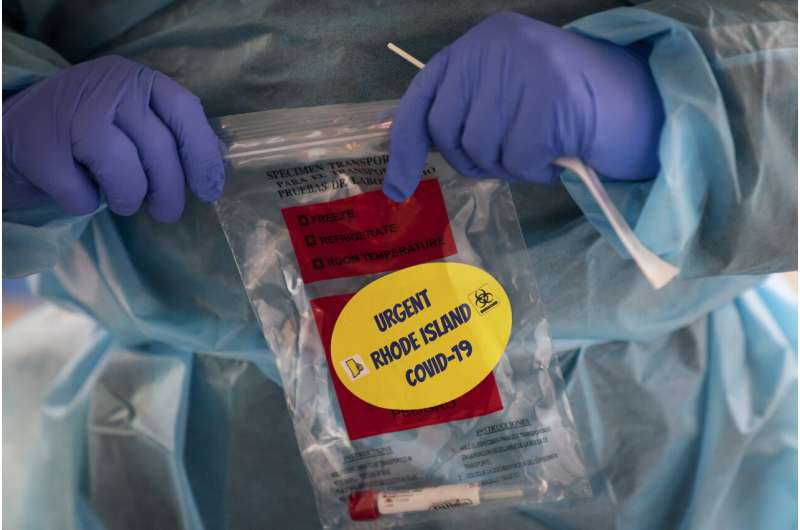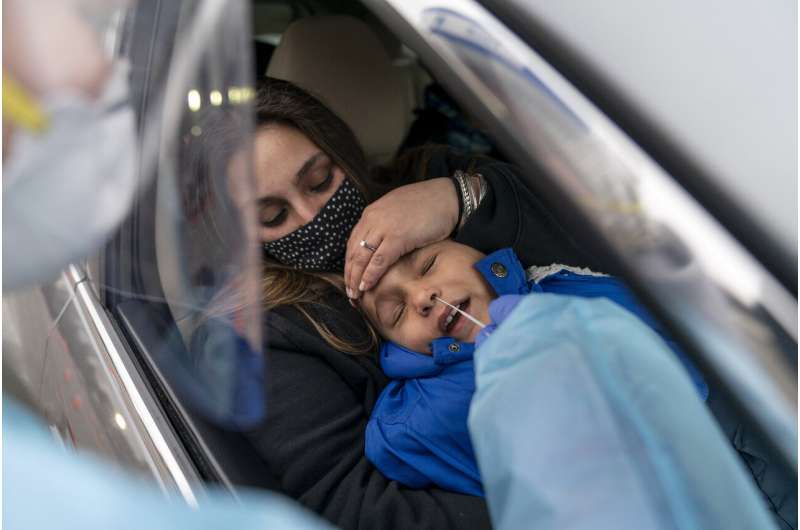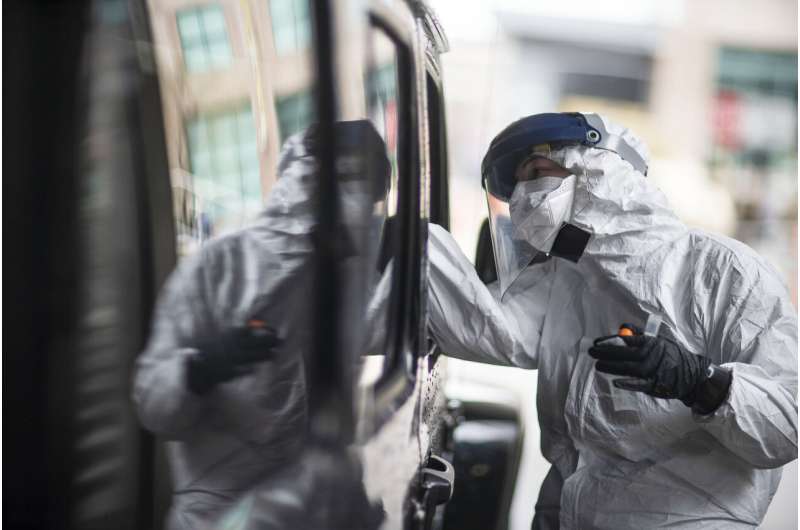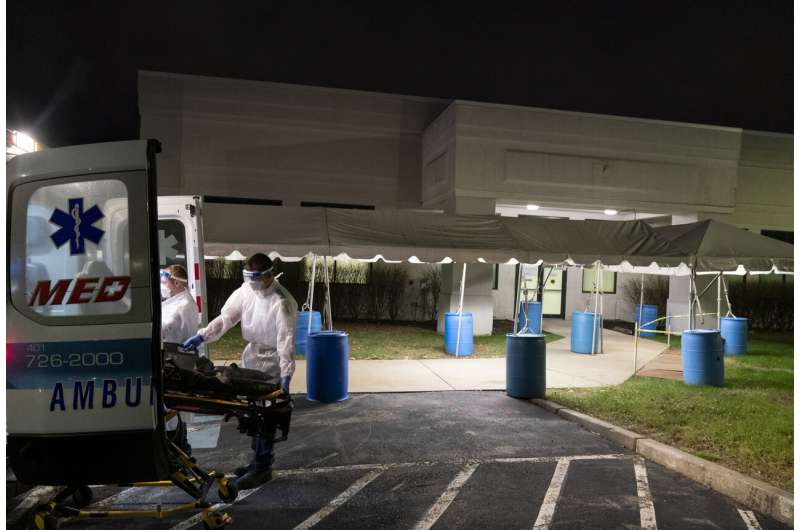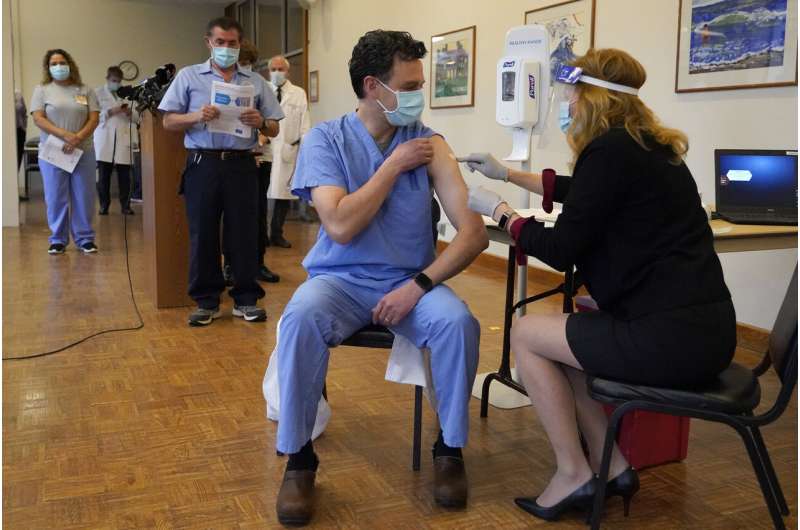In this Dec. 9, 2020, file photo, a health care worker carries a COVID-19 specimen from a motorist at a drive-thru testing site outside McCoy Stadium in Pawtucket, R.I. For a few days in December, the nation's smallest state of Rhode Island was one of the worst places on the planet when it came to new cases of COVID-19 per capita. (AP Photo/David Goldman)
For a few days in December, Rhode Island was one of the worst places on the planet when it came to new cases of COVID-19 per capita.
Hospitals hit capacity as the rate of new cases topped the nation, nearly double the rate in neighboring Connecticut. The state's record for daily COVID-19 deaths, set in April, was broken. Faced with a worsening crisis, Gov. Gina Raimondo reluctantly re-imposed tougher restrictions on businesses.
"I am surprised that we have done so poorly," Dr. Keith Corl, an emergency physician and faculty member at Brown University's Warren Alpert Medical School, said last week. "We are all exhausted, and now we're talking about staffing more ICU units."
The nation's smallest state by area has reported 1,855 pandemic deaths so far, far fewer than many states but giving Rhode Island the University of Rhode Island, Johnson & Wales University and Providence College.
Like other states, Rhode Island limited indoor dining and customer capacity at many businesses in the spring and temporarily shuttered bar areas, gyms and theaters. Tougher rules were reinstituted for the first three weeks of December after case numbers began to tick upward.
In this Dec. 9, 2020, file photo, Vanessa Castaneda, left, holds her son, Joshua, 3, as he's swabbed for COVID-19 at a drive-thru testing site outside McCoy Stadium in Pawtucket, R.I. For a few days in December, the nation's smallest state of Rhode Island was one of the worst places on the planet when it came to new cases of COVID-19 per capita. (AP Photo/David Goldman, File)
While physicians like Fine and Corl argue the restrictions haven't gone far enough, many business owners have expressed concerns about long-term economic damage to the state's hospitality and tourism industries.
Bob Leonard is the co-owner of the Coast Guard House, a seaside restaurant in Narragansett popular with tourists. He said his business worked hard to comply with the restrictions and doesn't think restaurants are responsible for the recent rise in cases.
"From what I've seen, it's people being at home and letting their guards down," he said.
___
SPOTTY DISTANCING & WEARING OF MASKS
Residents who ignore guidance on masks and social distancing also deserve some blame, Raimondo has said.
The Democratic governor also points to the state's vigorous testing program as an explanation for the recent surge. Rhode Island has performed more than 2 million tests, more per resident than any other state, according to Johns Hopkins University data. More testing means more asymptomatic cases will be identified—cases which might go unnoticed in other states.
-
A passenger gets swabbed for COVID-19 at a testing site at the convention center in Providence, R.I, Tuesday, Dec. 1, 2020. For a few days in December, the nation's smallest state of Rhode Island was one of the worst places on the planet when it came to new cases of COVID-19 per capita. (AP Photo/David Goldman, File)
-
In this Dec. 1, 2020, file photo, a stretcher is loaded back into an ambulance after EMTs dropped off a patient at a newly opened field hospital operated by Care New England to handle a surge of COVID-19 patients in Cranston, R.I. For a few days in December, the nation's smallest state of Rhode Island was one of the worst places on the planet when it came to new cases of COVID-19 per capita. (AP Photo/David Goldman)
-
In this Dec. 14, 2020, file photo, Dr. Christian Arbelaez, of Lifespan Health Care, receives the Pfizer-BioNTech vaccine for COVID-19, in Providence, R.I. For a few days in December, the nation's smallest state of Rhode Island was one of the worst places on the planet when it came to new cases of COVID-19 per capita. (AP Photo/Elise Amendola, File)
But testing doesn't fully account for December's increases in deaths and hospitalizations too, said Dr. Ashish Jha, a physician and dean of Brown's School of Public Health. Jha said he believes population density and poverty are bigger factors.
"Pandemics are complex. They are not simple, straightforward things," Jha said. "But we are learning a lot."
© 2021 The Associated Press. All rights reserved. This material may not be published, broadcast, rewritten or redistributed without permission.
